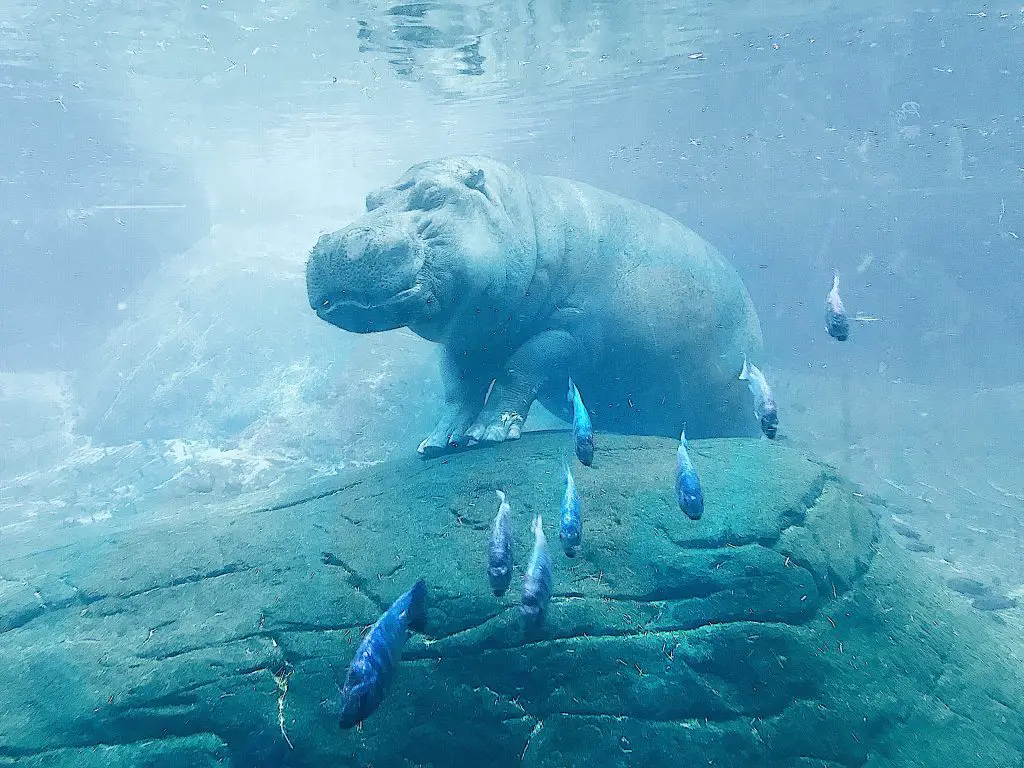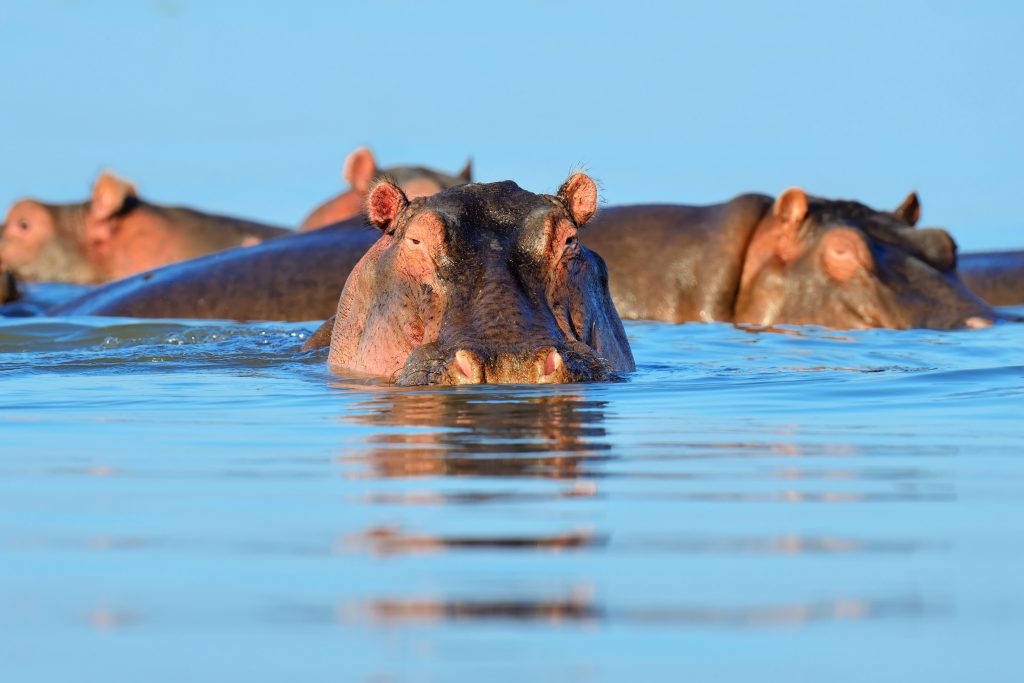Hippos spend a lot of time in or under water in their natural habitat. But, just like all mammals, they can’t breathe underwater. They have lungs, not gills.

How Can Hippos Breathe Underwater?
They can’t. Mammals – including hippos – have a dedicated respiratory system that only works with a constant movement of air in and out of the lungs. You cannot have water in your lungs – ever.
Hippos (both Common Hippos and Pygmy Hippos) spend around 16 hours a day in the water – either wallowing in the shallows or submerged completely under it. They have to return to the surface regularly to exhale the stale air and refresh their lungs with new air – just like us.
This fresh new air, laden with oxygen, needs to enter their giant lungs all the time: 24/7. A special mechanism in the lungs allows this oxygen to move into and travel around the body to keep everything working. Without oxygen, cells start to die.
This is the reason why breathing is innate – it is a natural action that happens almost without thinking. In fact, it is so natural that hippos even resurface in their sleep to breathe without waking up. Having to inhale as little as every 4 or so minutes, this constant rhythm allows them to stay in the safety of the water for as long as possible while still having a good snooze.
Baby hippos need to breathe more often – but they also do a lot more things underwater than their parents…
Are Baby Hippos Born Underwater?
Yes, – baby hippos of both species can be born underwater and then have to surface themselves for their first breath. Usually, a single calf is born – but sometimes there have been twins – and they are born in the water where the mother lives. Some Pygmy Hippos actually birth on land – especially noticed in captivity suggesting that safety is a big reason for the water births.
They also have to suckle underwater at times. More common with younger calves and with the Common Hippo – they have to dive down and feed while the mother is in or under the water herself. Calves need to breathe more frequently when underwater – so this is just a constant balance between the needs of the calf and the mother.
Often during the night, young calves are left in a hiding spot or in a creche while the mother is out of the water feeding. Mothers can wander over 9 miles a night in search of food; something a calf can’t do. But when the mother returns to check on the calf throughout the night – they call to each other – and the calves feed frequently.
As they get older, they often accompany mom out of the water and will suckle on land. Pygmy Hippos tend to suckle more on land at any age.

How Long Can Hippos Hold Their Breath For?
Most adult hippos can hold their breath for around 5 minutes naturally. However, it could potentially last longer in extreme circumstances – including mating where the female stays submerged practically the whole time – only popping her nose up to grab some fresh air when she can.
Male hippos can often be found in more turbulent waters than females (who prefer flowing but steady or pooling water) so there is a certain amount of danger involved in the rainy season. However, hippos are very tall (around 5ft at the shoulder) – so only the deepest of waters or an accident could cause them any issues getting back to the surface.
How Many Species of Hippo Can Breathe Underwater?
There are two species of hippo: the common hippo and the pygmy hippo. Although hippos are semi-aquatic, they cannot breathe underwater. They are adapted to stay submerged for several minutes by holding their breath. Hippos have strong communication skills and produce different vocalizations to convey their messages within their social groups.
Can Hippos Drown?
Accidents do happen – so although it isn’t very likely for a hippo to drown – it does occasionally happen. A healthy adult hippo wouldn’t ever just drown – and neither really would a baby hippo, although they are more likely to out of the two. However, drowning by accident or if attacked by another animal is always a possibility – again – more so for the babies.
Although virtually nothing will attack a healthy adult hippo – animals will attack baby hippos – especially crocodiles. And a crocodile’s modus operandi is ‘by drowning’ – so that is a very likely outcome. Many young hippos are left in the water alone while their mom goes off to feed and so this is when a crocodile could strike. Even when an adult has been left in charge of a nursery group – they can’t watch everything.
Maybe this is one of the reasons why adult hippos make a point of chasing off even the most sedate and least threatening crocodiles in the water. If they always make themselves known as being grumpy and likely to attack – crocodiles won’t even go near a hippo in the first place. By making sure you have already told the crocs that hippos aren’t on the menu – it might make them think twice when they come across an unattended calf…











